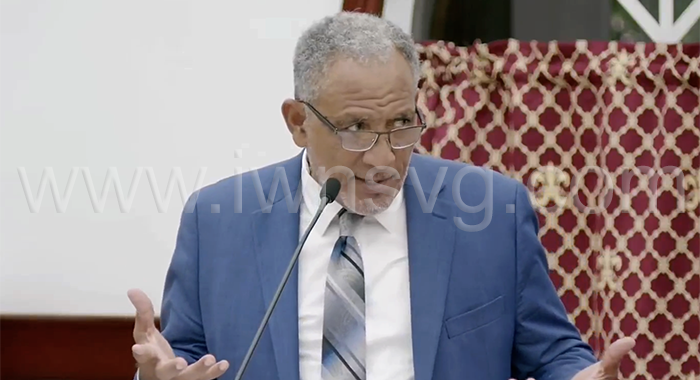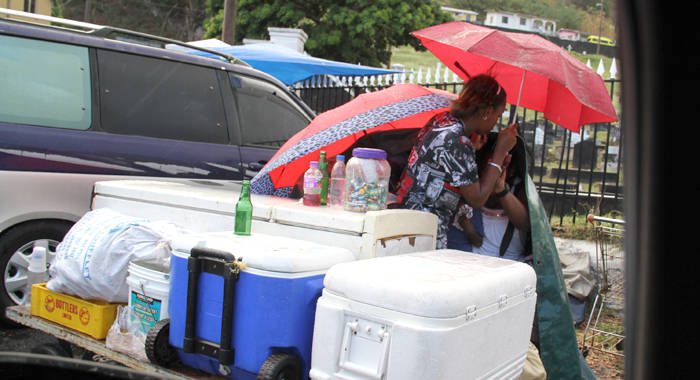Opposition Leader Godwin Friday on Tuesday expressed in Parliament his objection to the law banning the consumption of alcohol in funeral processions.
Friday said that while many people frown on the consumption of alcohol in funeral processions, the law, which government lawmakers went on to use their majority to pass, would create more problems than the one it was proposing to fix.
Leading off the debate on the Public Order (Amendment) Bill, 2024 presented by Prime Minister Ralph Gonsalves, the opposition leader said that the bill had been on the Order Paper for some time and had gone through several changes.
“It purports to address a problem that the prime minister has sought to explain, one which I think many persons in our community either have been somebody who was involved in the conduct or who may have frowned on the particular conduct,” Friday said.
He said the problem of drinking publicly is one that the Vincentian society has confronted and has found various ways to deal with.
The opposition leader said the prime minister had suggested that drinking in funeral processions had risen to the point where new legislation was needed to contain or prevent it.
Friday, however, noted that Gonsalves had outlined a number of pre-existing similar laws that frown on certain public behaviour but were not being enforced.
“And I do agree, that drinking in the funeral procession is conduct that … many people frown upon, or selling of alcohol close to a church or at the cemetery and so forth.”
The opposition leader said that while some people are discrete in their sale of alcohol at cemeteries, others may not be, for competitive reasons.
“But, by and large, the idea of making the response one of legislation to make an offence of the conduct is one that many people, certainly that I’ve spoken with, find that it is an overreach.”
The opposition leader said most of the argument presented by the prime minister seemed to have been suggesting that this drinking during a funeral procession was a minor type of offence.
“We have similar offences of this nature on the books. None of them, or very few of them, are ever enforced. Nobody ever deals with them,” Friday said.
“You don’t hear people getting arrested or charged for public nuisance, disorderly conduct, or drunkenness or so forth, and so that this seems to be that this would fall within that category of the type of offence. And to me, if that is how it’s going to be addressed and approached, then it doesn’t make sense to do it.”
Get rid of irrelevant laws
The opposition leader said that if there are offences on the books that should not be there because the social mores have changed, the laws should be cleaned up.
“Get rid of those offences that are no longer applicable to our modern-day society. Don’t add another one,” Friday said.

“It seems to me, that was the prime minister saying that this is not something that likely to be enforced,” the opposition leader told Parliament, adding that this is where he thinks the relevance of the argument that this is an overreach comes in.
“Because it seems to me that the same way that somebody in a procession could talk to somebody and say, ‘Listen, man, you’re making too much noise’ or ‘If you want to drink, go somewhere’, you could do that without the law being in place, which is what very often is done.”
Friday said the solemnity of a funeral procession is undoubted, adding that he goes to a lot of funerals and in some instances, people are drinking.
“Other persons will see that at the side of the road. To be honest, I don’t see it much in the procession itself … because you don’t have much of a procession in these days anyway. But yes, at the cemetery and elsewhere.”
Police at funeral services?
He said the challenge that the opposition has is when the conduct is made an offence.
“That is, you’re going to inject the police essentially in a funeral service. What is going to happen at a funeral service? The police are going to be there policing a funeral service? What violates the solemnity of the occasion more than injecting the police into this type of event?”
Friday said he feared that someone may have a drink and the police become overzealous in enforcing the law and it becomes more of a problem than the solution is intending to be.
“What will happen is that persons may find ways to conceal what they are consuming, they may find other ways to get around it, and then the police may become involved in trying to do detection as to whether somebody has alcohol or not in a funeral procession.”
Friday said the law seems to be giving the appearance that something is being done, “when, in fact, from the Prime Minister’s own rationale for the legislation, it’s like nothing will be done because of police ain’t go bother with it.
“That can’t be, it doesn’t make sense for us to be passing laws that criminalise, well, making an offence of certain conduct, bringing police resources into a funeral procession, into a solemn occasion, and running the risk of creating more problems than it would solve.”
The opposition leader said he found the law, as drafted “problematic’ and “very vague in respect of the powers that the police exercise”.
He noted that the law says the police cannot arrest someone just for having in their possession a beer or any alcoholic beverage.
“The police can only arrest if in the opinion of the police officer to do so is necessary for the safety of any person. It doesn’t even say whether it’s reasonable suspicion or some sort of a reasonableness requirement. It’s simply left to the discretion of the police officer to say if, in the police officer’s opinion, it is necessary to do so for the safety of any other person.
“That’s a broad scope that it gives any police officer to essentially go and arrest somebody at a funeral. You might say, well, this is not going to happen. Well, if it’s not going to happen, why do we have a law for it? Why is it on the books? And we don’t tempt the situation by simply saying that it’s not going to be done, but we put it there just in case we need to do it.”
Friday noted that under the law, a police officer cannot confiscate alcohol from somebody in a funeral procession.
“They could only do so as part of the arrest of a person who, as we know, is arrested not for possession of alcohol, but for public safety — the safety of any person in the opinion of the officer, and it’s on that basis, having done so, then you could confiscate the intoxicating liquor from the person.
“The way this legislation is drafted, it does not appear as intended to be enforced. And so what is the problem that it will solve?”
Friday spoke of the challenge of policing the law. “Are we going to have the resources that police officers will be on Sundays, on Saturdays, at funerals, all about the country trying to decide whether somebody is violating this new provision of the Public Order Act?
“You may say, ‘Well, no, this is not going to happen. The police have sense than that.’ Well, we should have more sense than passing legislation that are not going to be enforced.”
“Friday said he goes to many funerals and, for the most part, does not see ructions at funerals.”
Friday said that ordinarily, people go to funerals to show their respect to the deceased and sympathised with the bereaved “and to act in a way that recognizes the solemnity of the occasion. We all can agree on that.
“But, … the way in which this legislation intends to deal with what is perceived to be this emerging or this problem that has recently emerged, to me, it doesn’t achieve that objective. It gives too much scope to the police.”
Friday said that law utilises public resources in a way that is “inefficient and has the real potential of creating more disturbance in a solemn occasion of a funeral where persons are in altercations with the police, rather than focusing on what they’re there to do, which is to attend the funeral procession”.







This is just another attemp to restrict people’s rights. Why don’t you make a law to stop the dispicible behaviour you guys have in parliament?
Your behaviour in parliament is worse than any alcohol at a funeral.
Does the same thing happen during the carnival celebration? If it does then you can’t go after funerals alone.
From the time James removed the incumbent by one vote, you know what has taken place.
Friday I’m starting to feel sorry for you.
Who really cares about this ? Move along to the more serious issues please.
What need to happen is the steel pan and the disorderly d8stespectful behavior in the street
Bring back the respect and the solemnity to all funerals this would diffinitely curb the alcohol
The dirty hands spreading germs at the cemetery in those ice boxes .
Things passing from people handling the dead
The coffin sitting in a dead house so long and handing water for you to drink
These are important to rebuild the broken down fabrics of society